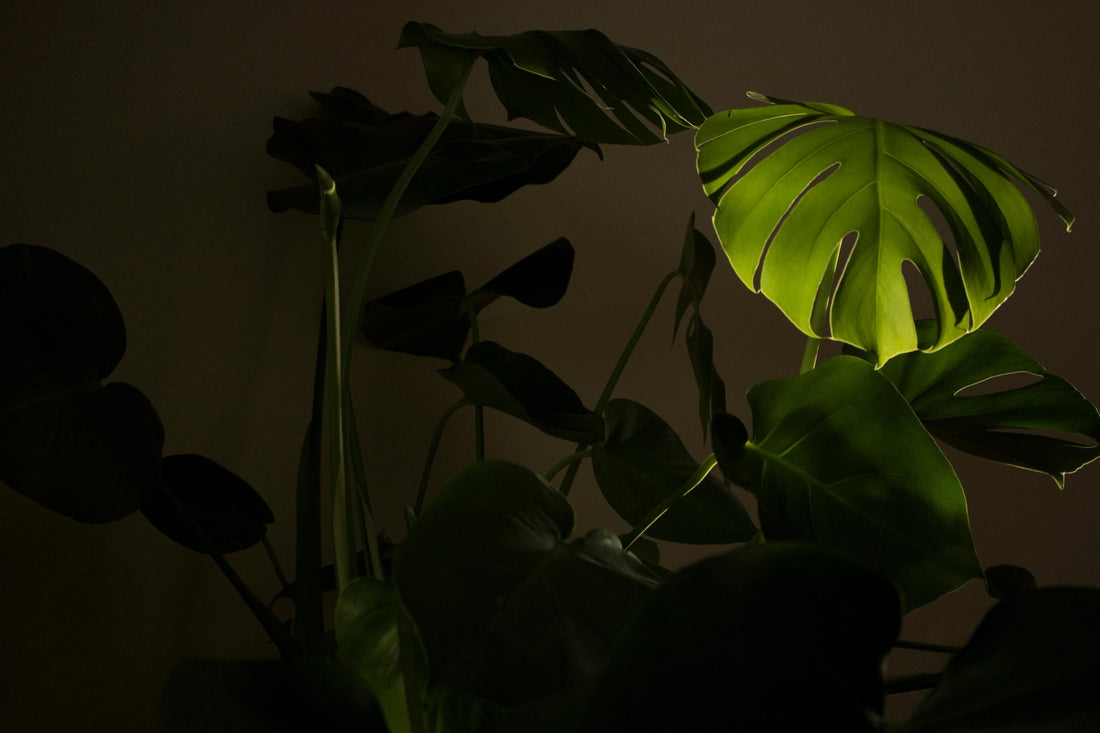
The Best Low Light Indoor Plants
Share
As the days grow shorter and the sunlight becomes scarce, many Canadians find themselves searching for ways to bring a bit of greenery and life into their homes. Winter can feel long and gray, but the right indoor plants can transform your space into a lush sanctuary, even with limited sunlight. Low-light indoor plants are perfect for winter months when natural light is at a premium, thriving in shaded corners or rooms with indirect light.
In this guide, we’ll explore the best low-light indoor plants, backed by expert recommendations and care tips, to help you select greenery that will thrive throughout the darker days of winter.
1. Snake Plant (Sansevieria trifasciata)
The snake plant, also known as "mother-in-law’s tongue," is one of the most resilient indoor plants available. Its tall, striking leaves can tolerate low light and thrive on minimal care.
Why It’s Great for Winter:
- Low Light Tolerance: The snake plant adapts to low light conditions, making it ideal for winter’s shorter days.
- Air Purification: Studies by NASA show that snake plants improve indoor air quality by filtering toxins like benzene and formaldehyde.
- Low Maintenance: It only requires occasional watering—once every 2-3 weeks in winter.
Care Tips:
- Place in indirect light or even a dimly lit corner.
- Avoid overwatering, as it’s prone to root rot in soggy soil.
2. ZZ Plant (Zamioculcas zamiifolia)
The ZZ plant is often called the “ultimate survivor” because of its ability to thrive in nearly any indoor environment, including low-light spaces.
Why It’s Great for Winter:
- Thrives in Low Light: Perfect for rooms with minimal natural light, like basements or north-facing rooms.
- Hardy and Durable: It’s drought-tolerant and doesn’t require frequent watering.
- Sleek and Stylish: Its glossy, dark green leaves add a modern touch to any interior.
Care Tips:
- Water sparingly, allowing the soil to dry out between waterings.
- Keep away from direct sunlight, which can scorch its leaves.
3. Pothos (Epipremnum aureum)
Known as the “Devil’s Ivy,” pothos is a popular trailing plant that can grow in just about any condition.
Why It’s Great for Winter:
- Adaptable: Thrives in low light, making it perfect for dim corners or winter-lit rooms.
- Air-Cleaning Properties: Filters out common indoor toxins like carbon monoxide and xylene.
- Vibrant Foliage: Its heart-shaped, variegated leaves bring a touch of brightness to your space.
Care Tips:
- Allow soil to dry between waterings to avoid overwatering.
- Prune occasionally to encourage fuller growth.
4. Peace Lily (Spathiphyllum)
The peace lily is not only beautiful but also one of the easiest flowering plants to care for in low-light conditions.
Why It’s Great for Winter:
- Low Light Tolerance: Thrives in shaded areas, even in the darkest winter months.
- Humidity Boost: Increases indoor humidity, which is especially helpful during the dry winter season.
- Air-Purifying Power: Effective at removing toxins like ammonia and acetone from the air.
Care Tips:
- Water when the top inch of soil feels dry.
- Keep away from drafts, as they can damage its delicate leaves.
5. Cast Iron Plant (Aspidistra elatior)
True to its name, the cast iron plant is virtually indestructible and thrives in low-light environments.
Why It’s Great for Winter:
- Tough and Durable: Tolerates neglect, low light, and irregular watering.
- Low Maintenance: Can go weeks without attention, making it perfect for busy households.
- Elegant Look: Its broad, deep green leaves bring a classic, understated beauty to your home.
Care Tips:
- Water sparingly and ensure good drainage.
- Wipe leaves occasionally to remove dust.
6. Chinese Evergreen (Aglaonema)
The Chinese evergreen is a striking plant known for its patterned leaves, which come in shades of green, silver, and sometimes red.
Why It’s Great for Winter:
- Thrives in Dim Light: Prefers indirect light but can tolerate low-light conditions.
- Air Purifier: Helps remove harmful toxins from indoor air.
- Low Maintenance: Requires minimal watering and care.
Care Tips:
- Keep the soil slightly moist but avoid overwatering.
- Rotate the plant occasionally for even growth.
7. Spider Plant (Chlorophytum comosum)
The spider plant is a classic choice for beginners and one of the easiest plants to grow indoors.
Why It’s Great for Winter:
- Adaptable: Tolerates low to medium light, making it ideal for winter homes.
- Hardy: Can survive inconsistent watering and cooler indoor temperatures.
- Pet-Friendly: Non-toxic to cats and dogs, making it a safe choice for pet owners.
Care Tips:
- Water when the top inch of soil is dry.
- Keep in a hanging basket or let its arching leaves trail over a shelf for a decorative touch.
8. Parlor Palm (Chamaedorea elegans)
If you’re looking for a tropical touch during winter, the parlor palm adds elegance and greenery to your home.
Why It’s Great for Winter:
- Low Light Tolerance: Grows well in indirect or low-light settings.
- Compact Size: Fits perfectly in small apartments or office spaces.
- Improves Air Quality: Removes toxins and adds moisture to the air.
Care Tips:
- Water sparingly in winter, letting the soil dry between waterings.
- Mist occasionally to increase humidity.
9. Dracaena (Dracaena marginata)
Dracaenas are versatile and low-maintenance plants with a variety of styles to suit different aesthetics.
Why It’s Great for Winter:
- Low Light Adaptability: Thrives in low to moderate light conditions.
- Air Purification: Removes toxins like formaldehyde and benzene.
- Modern Look: Its spiky, architectural leaves add a sleek touch to interiors.
Care Tips:
- Water when the top inch of soil is dry.
- Avoid overwatering, as dracaenas are sensitive to soggy soil.
10. Philodendron
Philodendrons are popular for their lush, heart-shaped leaves and adaptability to various indoor conditions.
Why It’s Great for Winter:
- Thrives in Low Light: Perfect for dim rooms or shaded areas.
- Easy Care: Requires minimal watering and attention.
- Stylish and Versatile: Works as a trailing plant or can be trained to climb.
Care Tips:
- Water when the soil feels dry to the touch.
- Keep away from cold drafts to protect its delicate leaves.
Tips for Keeping Indoor Plants Healthy in Winter
- Water Less Often: Most indoor plants require less water in winter. Let the soil dry out slightly between waterings.
- Dust the Leaves: Clean leaves allow plants to absorb more light, which is crucial in low-light conditions.
- Supplement with Grow Lights: If your home lacks natural light, consider investing in energy-efficient LED grow lights to support plant growth.
- Avoid Drafts and Heaters: Keep plants away from cold drafts and direct exposure to heating vents, as these can damage foliage.
- Monitor Humidity: Winter air can be dry, so use a humidifier or mist plants occasionally to maintain adequate moisture levels.
A Summary
Low-light indoor plants are the perfect solution for bringing greenery into your home during the long, dark winter months. Whether you’re drawn to the striking leaves of a snake plant, the easy care of a pothos, or the air-purifying power of a peace lily, there’s a plant for every space and level of experience.
As you brighten your home with low-light indoor plants this winter, think about how the rest of your space can reflect the same care and thoughtfulness. Just as plants bring life and freshness, Vearthy’s sustainable essentials—like bamboo bedding and eco-friendly home goods—offer a simple way to create a cozy, planet-friendly environment. By choosing products designed with sustainability in mind, you can cultivate a space that nurtures both you and the planet. Explore Vearthy’s collection to complement your green sanctuary with thoughtful, sustainable touches.
🌿 Explore Sustainable Essentials for Your Home
Ready to complete your cozy, planet-friendly space? Discover Vearthy’s collection of sustainable bamboo bedding, eco-friendly home goods, and more.
